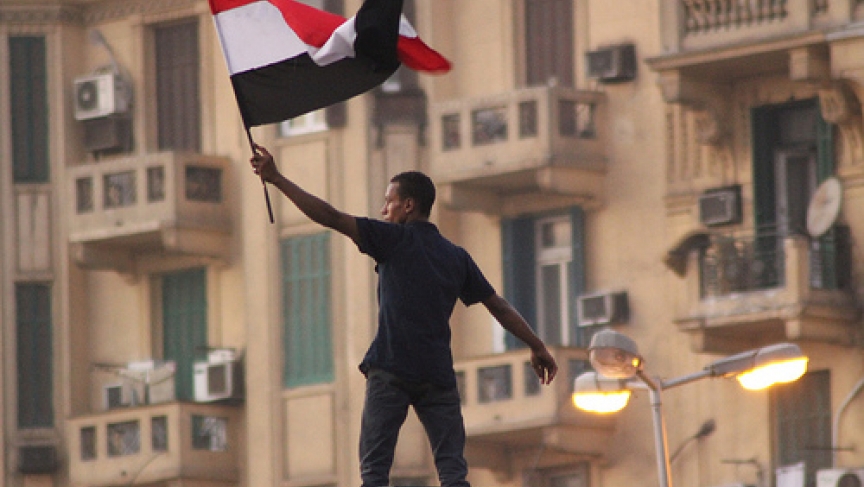Millennials are set to become a potent force in the Middle East. And often their perspectives and politics don't match those of today's leaders.
"In the Arab world, they are particularly populous — about 40 percent of the population — so it is an enormous bulge of people," says Juan Cole, director of the Center for Middle Eastern and North African Studies at the University of Michigan. In the US, by comparison, this generation — born roughly from the late 70s through the year 2000 — makes up 25 percent of the population.
"What's interesting about them is not just that they're there and that they're young," says Cole, "because that's true of youth in India, Indonesia, and a lot of places in the world. But they're organizing on the basis of being young."
Cole says millennials in the Middle East are forming political, social and cultural organizations specifically designed to represent the goals and interests of their generation.
"The divisions of their parent's generation were really about a kind of military nationalism versus political Islam — that was the great divide," says Cole, who wrote The New Arabs: How the Millennial Generation is Changing the Middle.... "Baby boomers and people who are now in their 60s are still duking it out over those issues."
"But the social science on the younger generation — the millennials in the Arab world — suggests that they are much more interested in networking and have a more democratic view of how society should work."
According to Cole, they are universally less religious and observant than generations that have preceded them. He says this demographic is also less interested in traditional forms of democracy, like political parties.
"In many ways, the dictators of the region — Hosni Mubark in Egypt, who ruled from 1981 till 2011, and others in Tunisia and elsewhere — destroyed a lot of the old political parties," he says. "The youth tend to be fairly alienated from parties, and not very interested in them."
Millennial activists in the region, he says, also tend to be more liberal than older generations. Many report that they would emigrate to the West if they could. "These people really want to see their own societies shaped in a different direction, and that's where they've put their energies," he says.
That was evident in the Arab Spring uprisings, when youth took to the streets to overturn the old, autocratic order of the Middle East. After World War I, European powers redrew the political map to erase ethnic and tribal lines in favor of strict national boundaries, with little regard for the past, and no regard for the will of the people.
Over the last century, staunch dictators maintained those boundaries and quashed dissent across the region. During the Cold War, and particularly after the Iranian Revolution, the US continued to support dictatorships across the Middle East, until the winter of 2011 gave way to the Arab Spring.
"People don't realize how young these guys were, these young women and young men who made these revolutions," says Cole. "It is way too soon to tell how the changes that they kicked off in 2011 are going to work out."
And he argues that these 20 and 30 year olds don't have the same attachment to issues that have long defined the politics of the region, such as the Israeli-Palestinian conflict.
"These young people obviously have sympathies with the Palestinians and how they view them to be treated by the Israelis," says Cole, "but by and large, at least in the past three years, they haven't made Israel the issue."
Cole says young activists are determined to bring something new to their nations and do not want to be distracted by outside politics. "There's a feeling amongst them that the old dictatorial regimes would use Israel and American foreign policy as ways of deflecting critiques of how their country was actually run when it came to domestic policy."
In the three years since the Arab Spring began, Tunisia, Egypt, and Libya have all seen setbacks in achieving stability, democracy and human rights. Still, Cole believes the youth who led the Arab Spring will remake their countries. It will just take time.
The young Arab activists profiled in Juan Cole's new book defy the headlines of Mideast violence. You'll meet, for example, a thirty-something Tunisian activist, Amira Yahyaoui.
"She wears dark glasses and she is a voracious reader," Cole says. "She'll read existentialist literature by eastern European writers exiled to Paris in the 1960s. She'll read medieval and early modern thought. And she formed an organization, Al Bawsala, which monitored the drafting of the new constitution after the revolution, and looked at the position of women in it, and civil liberties and just kept the pressure on the members of the constituent assembly to observe international human rights norms with some great success."
Cole calls Yahyaoui "particularly courageous and outspoken," but argues that her values are widely shared among millennial Arabs.
— Joyce Hackel/PRI's The World




You need to be a member of Network for Youth in Transition to add comments!
Join Network for Youth in Transition